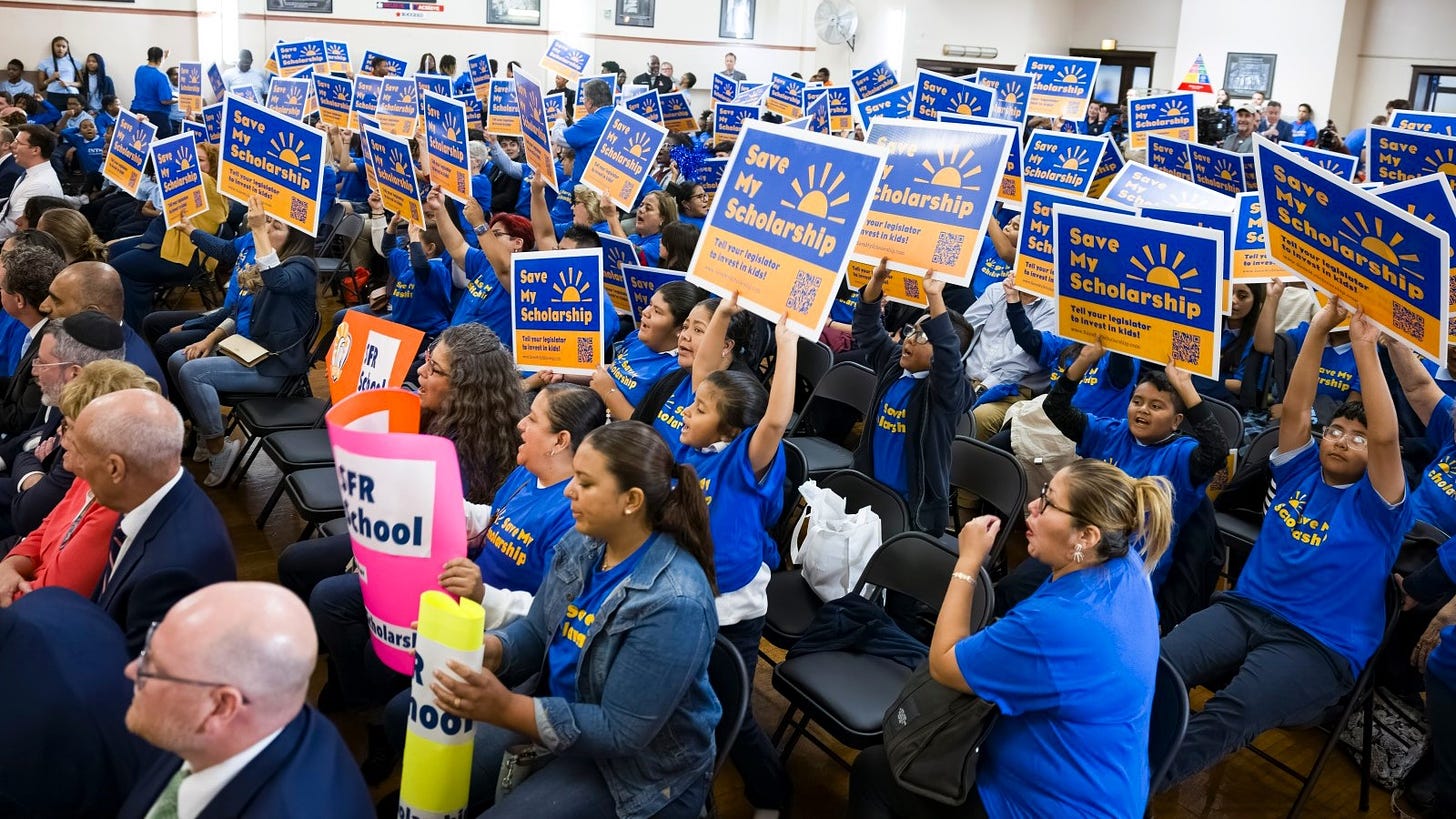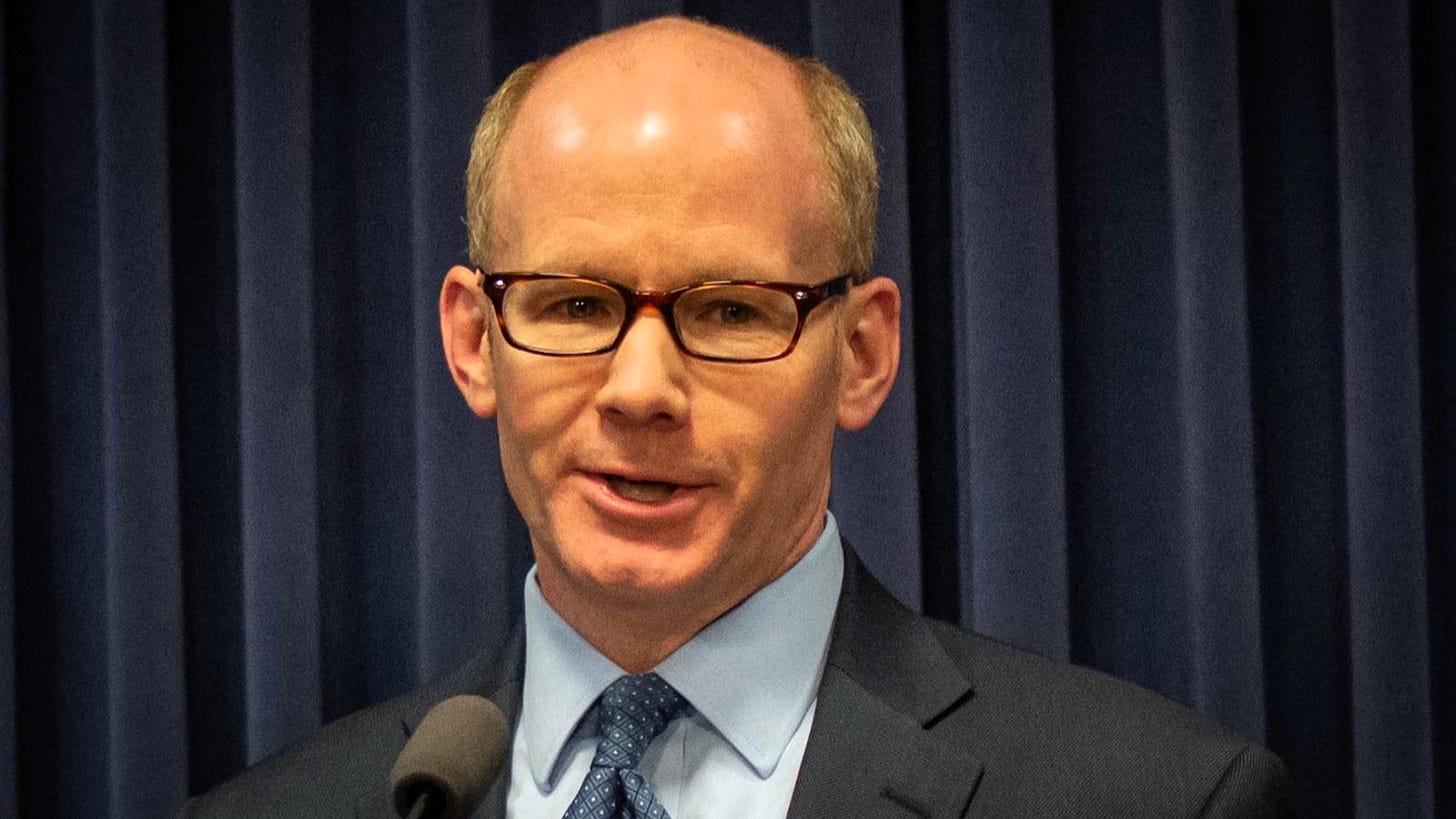THE ILLINOIZE: Monday Free for All...Veto session post-mortem...Invest in Kids...Elected Chicago School Board...Nuclear moratorium lifted
November 13, 2023
Good morning, Illinois.
We survived veto session, which is more than can be said for the Invest in Kids program. My assumption is we’ll turn our attention more to politics the next couple of weeks as petition filing begins the Monday after Thanksgiving.
But, then again, the world likes to throw us a few curveballs.
The General Assembly is gone until January 16. There is nothing on Governor Pritzker’s public schedule today.
Last week, paid subscribers received eight newsletters and updates, multiple of which had breaking news and exclusive information about the end of veto session.
Join us as a paid subscriber now to get in the know and show your support for independent political coverage that doesn’t owe anybody from any political party anything.
Click below and you can jump in for $14.99 per month.
Let’s get to it.
YOUR MONDAY FREE FOR ALL
(note: we’re not responsible for paywalls and restrictions from other news outlets, because good journalism isn’t free)
Illinois’ controversial private school scholarship program is ending (WBEZ)
Illinois’ five-year-old experiment with a [charitable] school choice program is ending. Despite a concerted push from Republican lawmakers and advocacy groups during this week’s fall legislative session, lawmakers did not take action and the Invest in Kids tax credit scholarship program is set to sunset at the end of this school year.
The controversial program allows taxpayers to earn an income tax credit by donating to scholarship funds across the state that send students from lower-income households to private schools. About 9,700 students across the state received scholarships last year. Students with scholarships this year will be allowed to finish out the school year.
Proponents say the program offers school choice for low-income students. Empower Illinois, the state’s largest scholarship granting organization, says the average family income for its scholarship recipients was $45,000. About two-thirds of the children on scholarship in Cook and surrounding collar counties in 2022 were from families of color, according to the group’s annual report.
They vow to continue the fight to save the program when lawmakers return in January.
But critics argue the $75 million program takes money from already underfunded public schools and funnels public dollars to private schools, many of which are religious.
Just a reminder, that is $75 million in potential GRF revenue (that would likely be donated elsewhere and would still get a tax break) when the state is spending $3.7 billion on K-12 this year. It’s a raindrop in Lake Michigan.
Related: Lawmakers decline to extend private school scholarship tax credit program (Capitol News Illinois)
Lawmakers move not to renew Invest in Kids (State Journal-Register)
Illinois legislators leave Springfield with no accord on next year’s Chicago school board elections (Chicago Tribune)
Less than 12 months before Chicago voters head to the polls to elect the city’s school board for the first time, Illinois lawmakers adjourned for the year Thursday without reaching an agreement on how to conduct the first round of balloting.
The House and Senate each approved separate plans for the election, but the House moved first and gaveled its session to a close before the Senate voted on its own plan. The Senate then declined to take up the House proposal, instead passing a competing plan proposed by Senate President Don Harmon before heading home for the year.
The Democratic-controlled legislature also left Springfield without taking action to preserve a controversial tax credit program for private school scholarships that will expire at the end of the year.
Legislators said they have reached agreement on a 20-district map for the elected Chicago school board that would create seven majority-Black districts, six majority-Latino districts, five majority-white districts and two in which no group has a majority.
“The Senate’s work is never done, and I’m not so full of myself or the Senate to pretend that it is,” Harmon said after the 38-12 vote in favor of his plan. “We always are willing to entertain good ideas. But this represents the Senate’s marker for the best elected, representative school board bill that’s ever been presented.”
Harmon said there’s plenty of time to resolve the matter before their self-imposed April 1 deadline, which was pushed back from last July 1 after lawmakers failed to reach an agreement during their spring session.
The House plan, approved Wednesday on a 78-33 vote, more closely aligns with the 2021 law that created the elected board, with half of the 20 members elected next November and the remaining 10 and a board president appointed by Mayor Brandon Johnson. CPS would then transition to a fully elected board after the 2026 election.
Under Harmon’s plan, all 20 board members would be elected to two-year terms in November 2024 and the mayor would appoint the board president.
Related: Unfinished assignment: Lawmakers leave Springfield without final plan for Chicago elected school board (Chicago Sun-Times)
Illinois General Assembly punts Chicago school board election (Crain’s Chicago Business)
Lawmakers approve lifting Illinois moratorium on new nuclear reactors (Chicago Sun-Times)
Lawmakers left Springfield on Thursday with a bipartisan agreement on a measure that will lift a 36-year moratorium on new nuclear power plants in the state — and Gov. J.B. Pritzker has vowed to sign it.
Proponents say smaller nuclear reactors will help get the state to its goal of being carbon-free by 2045 by providing an alternative to coal and natural gas. Opponents, however, say new nuclear power plants would take away resources from renewable energy, adding that there are more cost-friendly ways to reach the state’s clean energy goals.
The measure, which cleared the Illinois House 98-8, lifts the ban on nuclear reactors producing less than 300 megawatts beginning January 1, 2026. The Illinois Senate cleared the legislation on Wednesday. Rules establishing issues like environmental monitoring and emergency preparedness would also be due by that date, with the Illinois Environmental Protection Agency providing consultation.
Pritzker in August vetoed the lifting of the moratorium that was approved in a separate bill, saying it did not provide regulatory protections for the health and safety of Illinois residents. Pritzker also said there was an “overly broad definition of advanced reactor” that could open the door to large-scale nuclear power plants. Environmental groups like the Sierra Club and the Illinois Environmental Council had asked for the veto.
But a measure filed by State Sen. Sue Rezin, R-Morris, and State Rep. Lance Yednock, D-Ottawa, during the veto session seemed to address those concerns, adding in provisions that would task the Illinois Emergency Management Agency with oversight of newly installed reactors.
Instead of working to override the veto, the governor’s team negotiated on the new measure with senators. The legislation was supported by labor, and the Illinois Environmental Council took a neutral stance on the new measure.
“This new bill addresses my concerns from the spring session’s proposal and I’m looking forward to reviewing and signing it when it reaches my desk,” Pritzker said in a statement. “Illinois is already a leader in clean energy under the Climate and Equitable Jobs Act, and developing an on-ramp for responsible small nuclear reactor development is another step towards a cleaner, climate-friendly future for our state.”
The legislation also authorizes Pritzker to commission a study to research the state’s role in guiding the development of new nuclear technology.
“In order to achieve our clean energy goals, we may have to invest in more nuclear generated carbon-free energy,” Yednock said on the House floor. “The policy does not subtract from the growth of wind and solar energy.”
Related: Illinois could see more nuclear reactors by 2026 (WBEZ)
Lawmakers send Gov. J.B. Pritzker revised proposal to lift Illinois moratorium on new nuclear plants (Chicago Tribune)
Illinois lawmakers OK new nuclear technology (Associated Press)
STORIES FROM THEILLINOIZE.COM LAST WEEK
How the Elected Chicago School Board Became the Fight of Veto Session
Welch Wants 71 Democratic Votes Before Extending Invest in Kids
POLITICAL POTPOURRI
Illinois lawmakers validate referendums creating mental health funding for 5 suburban townships and Will County (Chicago Tribune)
Brandon Johnson wasn’t supposed to take campaign money from city contractors, but he did (Chicago Sun-Times)
Third city employee accused Chicago Treasurer Melissa Conyears-Ervin of unethical conduct, records show (Chicago Tribune)
10-day paid leave plan passes City Council: Chicago employers must give workers more time off than others in Illinois (Chicago Sun-Times)
Illinois Chamber of Commerce appoints new president and CEO (Crain’s Chicago Business)
President Biden visits Belvidere to celebrate UAW victory in restarting plant, saving ‘the beating heart’ of a small auto town (Chicago Tribune)
Man from southwest suburbs accused of spraying officers, breaking windows during Capitol riot (Chicago Sun-Times)
Suburban woman pleads guilty to charges in connection to Jan. 6 Capitol riot (Shaw Media)
Orland Park pastor accused with Trump in Georgia election tampering says he will not ‘cooperate with evil’ and take plea deal (Chicago Tribune)
Commission weighs whether to discipline Illinois judge who reversed rape conviction (Associated Press)
Worth the wait: Springfield World War II veteran receives Congressional Gold medal (State Journal-Register)
Editorial: Gun-ban registration rule another aspect of legal dispute (Champaign News-Gazette)
Editorial: Make media literacy education a reality (Daily Herald)
Opinion: Governor takes advantage of chance to brag about fiscal record (Shaw Media)
Opinion: As ex-Ald. Edward Burke faces trial, Chicagoans are told yet again that it was ‘just politics’ (Chicago Tribune)
Opinion: Pro-life or Pro-lie? (Chicago Magazine)
JOIN US












